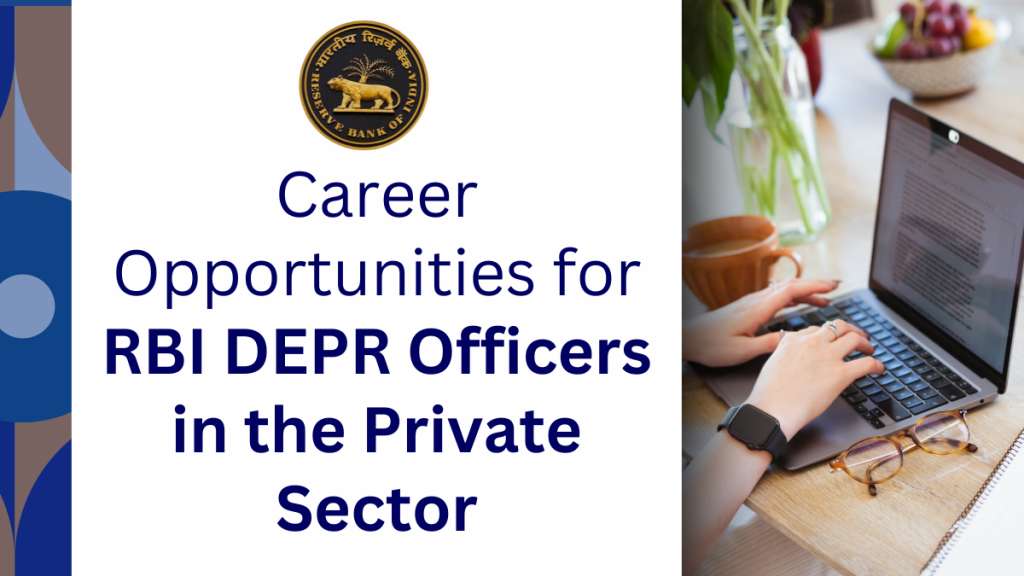The Reserve Bank of India (RBI) serves as India’s central bank playing a key role in keeping the country’s economy stable and nurtures its growth. The RBI’s Department of Economic and Policy Research (DEPR) operates by providing thorough economic research and provides crucial advice on different economic policies that affect the country’s growth. Officers in the RBI Grade B DEPR are highly skilled professionals, possessing deep expertise in economic analysis and policy formulation. Their work directly contributes to the development of economic policies that guide the country’s financial and economic landscape.
Careers within the RBI Grade B DEPR are often seen as lifelong opportunities within the public sector. However, the skills and experience RBI Grade B DEPR officers gain open up plenty of new opportunities for employees within the private sector as well. These officers’ deep understanding of economic policies, research capabilities, and analytical skills are highly valued in private banks, financial institutions, consulting firms, and global corporations. Transitioning from the public to the private sector can lead to roles such as Chief Economist, Research Analyst, Policy Advisor, and Economic Consultant. Thus, while a career at the RBI offers stability and growth, the private sector presents an attractive avenue for further professional and financial advancement. Through this blog, we will take you through the career opportunities for RBI Grade B DEPR officers within the private sector.

Eligibility Criteria for RBI Grade B DEPR
Before exploring the private sector opportunities for RBI Grade B DEPR officers, it’s crucial to understand the RBI Grade B DEPR Eligibility Criteria for this role. To become an RBI Grade B DEPR officer, candidates must have a Master’s Degree in Economics with at least 55% marks or an equivalent grade in aggregate from a recognized university. Those with a Ph.D. in Economics are preferred for higher roles. The upper age limit is generally 30 years, with certain relaxations for candidates from reserved categories as per government norms. While prior research experience in economics is an advantage, it is not mandatory. Additionally, candidates must be citizens of India. These criteria ensure that candidates are well-qualified to handle the responsibilities of an RBI DEPR officer, preparing them for potential roles in both public and private sectors. Take a look at the table below for a clear understanding on the RBI Grade B DEPR eligibility criteria.
| Eligibility Details | Criteria |
| Educational Qualifications | Master’s Degree in Economics with at least 55% marks; Ph.D. preferred |
| Age Limit | 21- 30 (relaxation for reserved categories) |
| Experience | Prior experience in economics advantageous but not mandatory |
| Nationality | Must be a citizen of India |
RBI Grade B DEPR Salary
Upon appointment as an RBI Grade B (DEPR) Officer, your compensation will be structured within the pay scale of ₹55200-2850(9)-80850-EB-2850 (2) – 86550-3300(4)-99750 (16 years). This comprehensive scale ensures steady growth over your career. The RBI Grade B DEPR salary package is now notably attractive, with a starting monthly gross emolument totaling around ₹1,16,914. This impressive figure includes a range of allowances and perks designed to enhance your overall compensation.
In addition to the base salary, Grade B Officers are entitled to receive various supplementary benefits. These include Dearness Allowance (D.A) to offset inflation, House Rent Allowance (H.R.A) to support housing costs, and Conveyance Allowance (C.A) for transportation expenses. Other perks may include medical benefits, leave travel concessions, and performance-linked incentives. For detailed insights, please refer to the table below.
| Components | Details |
| Pay Scale | ₹55200-2850(9)-80850-EB-2850 (2) – 86550-3300(4)-99750 (16 years) |
| Starting Monthly Gross Emolument | Around ₹1,16,914 |
| Allowances and Perks | Includes various allowances such as Dearness Allowance (D.A), House Rent Allowance (H.R.A), Conveyance Allowance (C.A), and more |
| Additional Benefits | Grade B Officers are entitled to receive multiple supplementary benefits |
Career Path and Growth Opportunities in RBI Grade B DEPR
A career as an RBI DEPR officer provides an array of growth opportunities within the central bank. Officers can advance through different ranks, from Assistant Manager to Deputy General Manager, based on their performance and exposure. This progression path ensures continuous development and appreciation. Additionally, the RBI offers opportunities for further learning and training, in India as well as overseas. This helps officers to bolster their knowledge and career growth. Also the institutions provide specialized mathematical training programs for a certain research team who are preparing to work in the field of finance. These programs are design to provide the students with specialized training in advanced economic theories, data analysis, and research techniques. The career progression and learning opportunities make the role of an RBI Grade B DEPR officer immensely fulfilling and dynamic.
RBI Grade B DEPR: Transition to the Private Sector
Though the public sector has its perks of being stable and prosperous, many DEPR officers from RBI are seen making a switch to the private sector. The drive behind this switch is multi-fold. multitude pay packages are a definite bonus. For the many private players, upside earning is a definite plus. The sheer variety of roles compliments their expertise acquired during different roles–as strategic planner while in service, as an economic consultant later during transition. The RBI officers are aptly equipped for this realignment, having gathered both honed acumen and the rich experience. Additionally, their comprehensive understanding of policy, strong analytical and research base make them a robust value proposition in the private sector and worth the hefty money that the industry is willing to pay them
RBI Grade B DEPR: Private Sector Opportunities
Key private sector opportunities for RBI DEPR officers are abundant due to their extensive expertise in monetary rules and evaluation. The private sector appreciates its capabilities in strategic planning, research and policy evaluation, supplying roles in banking, economic offerings, consultancies and large organizations. These options offer better rewards, numerous procedural features and a dynamic painting environment, making the transition from public service to private business appealing and worthwhile. Check out a few of them below:
- Banking and Financial Services: Private banks and financial institutions really value the expertise offered by RBI DEPR officers. There are roles like those of Chief Economist, Research Analyst, and Policy Advisor are common ones which these professionals can take up. Their complete understanding of different economic policies and market dynamics makes them the perfect candidates for strategic roles in these organizations.
- Consulting Firms: Global consulting firms such as McKinsey, Boston Consulting Group and Deloitte are regularly looking for experienced economists to offer insights and techniques to their clients. DEPR officers’ experience with coverage analysis and financial studies can be invaluable in advisory roles helping businesses navigate a complex financial environment.
- Corporate Sector: Large corporations, especially those with a global presence, require economic experts to analyze market trends, forecast economic conditions, and develop strategic plans. Positions such as Economic Advisor, Strategic Planning Manager, and Chief Economic Consultant are well-suited for former RBI DEPR officers.
- Think Tanks and Research Institutions: Many think tanks and research institutions focus on economic policy and development. These organizations value the expertise of RBI DEPR officers in conducting in-depth research, writing policy papers, and providing expert opinions on economic matters. Roles such as Senior Researcher or Research Director are common in these settings.
- International Organizations: Organizations like the World Bank, International Monetary Fund (IMF), and Asian Development Bank (ADB) often recruit economists with central banking experience. RBI DEPR officers can find exciting opportunities in these institutions, contributing to global economic policy and development projects.
- Academia: Some RBI DEPR officers choose to transition into academic roles, leveraging their practical experience and research skills. Positions in universities and business schools as professors or research fellows allow them to contribute to economic education and continue their research interests.
- Fintech Companies: With the rise of financial technology, many fintech companies are in search of experts who understand both economic policy and financial systems. RBI DEPR officers can find roles in areas such as regulatory compliance, economic forecasting, and strategic planning within these innovative companies.
RBI Grade B DEPR Skills Valued in the Private Sector
RBI Grade B DEPR officers have a number of competencies that are especially valued in the non-public zone. Their expertise in economic policy assessment, information interpretation and strategic planning is key to the various roles. In addition, their robust research skills, strong conversational competence, and coverage method experience make them top contenders for excessive positions in banking, consulting, corporate access, and worldwide companies. Take a look at some of the skills that are highly valued in the private sector:
- Analytical Skills: The ability to analyze complex economic data and trends is quite important. RBI DEPR officers are trained to interpret data and provide actionable insights, a skill that is in high demand in the private sector.
- Policy Formulation and Evaluation: Experience in developing and evaluating economic policies provides a strong foundation for strategic roles in private organizations, where policy analysis and implementation are critical.
- Research Capabilities: Conducting rigorous economic research and producing detailed reports is a core part of a DEPR officer’s job. This expertise is highly sought after in consulting firms, think tanks, and research institutions.
- Communication Skills: Effective communication, both written and verbal, is essential for presenting research findings and policy recommendations. DEPR officers’ experience in preparing reports and engaging with stakeholders is highly valuable.
- Leadership and Teamwork: Working in collaborative environments and major study teams are skills transferable to management roles in the non-public sector. These stories enable RBI Grade B DEPR officials to properly handle diverse groups, encourage innovation and push for strategic assignments. Their potential to work cohesively with diverse stakeholders and lead complex initiatives ensures that they will be able to thrive in leadership positions in dynamic private companies.
Challenges for RBI DEPRs in the Private Sector
Transitioning to the non-public sector can present some challenges along with adapting to a high-pressure, fast-paced environment compared to a public approach. Understanding and integrating into a new company tradition, dealing with increased expectations for overall performance, and navigating the competitive landscape can be daunting. However, these challenging situations can be mitigated with flexibility, a proactive approach and the use of current skills and discretion.
- Adapting to a New Environment: The private sector works than the public sector. It focuses more on making money and staying ahead of competitors. To fit in this new setting, you need to be flexible and open to learning. You might have to pick up new skills to match the private sector’s business goals and use new ideas that help companies do well.
- Navigating Corporate Culture: Getting used to and adjusting to the company culture can be tough for people who are used to the strict and rank-based nature of the public sector. This means understanding the unwritten rules and relationships that affect how people work together and make choices at work. To fit in well, it’s important to build good connections with others and understand the small details of how to act in a company.
- Managing Expectations: Companies outside the government want people to work harder and do more. RBI DEPR workers should get ready for a job that moves quicker and cares a lot about results. To do well in these jobs and grow their careers, they need to think about doing good work and showing how much they’ve done. It helps to focus on getting things done that you can measure and prove.
Prepping for RBI Exams with ixamBee
ixamBee provides extensive online coaching and other resources for RBI Grade B DEPR Exams through which the RBI seeks out new talents for its organizations. These courses prepare students for promising career paths and help them to contribute quite extensively to the RBI’s mission of shaping a new and progressive India. Notably, ixamBee offers its aspirants with RBI Grade B DEPR Mock Tests. These tests will help aspirants to simulate exam conditions and analyze their performance perfectly. These mock tests have been designed carefully to resemble the actual RBI Grade B DEPR exam pattern & Syllabus. It offers some careful insights into the different kinds of questions, time management, and overall exam dynamics.
Moreover, ixamBee also offers its aspirants RBI Grade B DEPR Previous Year Papers, which gives insights into the previous trends of the RBI exams. Looking carefully at these past papers will help candidates to understand more about the exam. It will help them to fine-tune their preparation according to this. Besides this, the RBI Grade B DEPR Online Courses provided by ixamBee have been created by experts. They include the complete syllabus and offer features like study notes and video lessons to help aspirants. Finally, BeePedia is another resource which helps aspirants for preparing the General Awareness section.
Summing Up
RBI DEPR officers have a wealth of knowledge and their insight is incredibly valued in many industries. While the public region provides stability and success, the non-public zone gives opportunities for great growth, better pay and different roles. Transitioning to the private sector requires careful planning and flexibility, but the rewards are wide. For those seeking a dynamic profession with global impact, using their skills in the non-public sector is a compelling and worthwhile path.
To help you prepare 50% faster for competitive exams, ixamBee provides free Mock Test Series and all the Current Affairs in English and Current Affairs in Hindi in the BeePedia capsules for GA Preparation. You can also get the latest updates for Bank PO, Bank Clerk, SSC, RBI Grade B, NABARD, and Other Government Jobs.
Also Read:
RBI Moves 100 Tonnes of Gold to India: What It Means
Some RBI Grade B Preparation Tips for Non-Banking Backgrounds
RBI Grade B 2024: Expected Exam Dates, Eligibility, Exam Pattern & More.















